Kyle Garret's Blog, page 19
January 21, 2013
I'd rather be fishing.
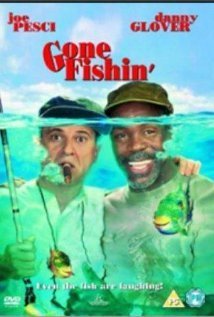 Not really.
Not really.I am well aware of the fact that the bitching and moaning that I sometimes do in this blog is kind of silly, given that I'm currently sitting in my home office of the house my wife and I just bought on a cul-de-sac in the suburbs. I have a belly full of food, the heat is on, and I'm drinking whiskey. Tonight, as every night, I will lie in bed next to my best friend in the entire world, and will also most likely be visited at various points through the evening my two wonderfully affectionate, adorable cats.
It's not like I'm digging ditches.
I have found lately that my desire to always be doing something other than what I'm doing is troublesome. As I have put it in the past, I always want to be doing something other than what I'm doing, even if what I'm doing is something I want to do. And part of that is just me being crazy.
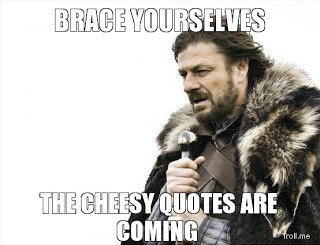 Lately at work I've been given more and more responsibility, which is fine. At the very least, the day goes by faster when I have more to do. But I've always been reluctant to throw myself fully into any job that I have. Ultimately, it's because I don't want to put more energy into than I have to, because the focus of my energy has to be/needs to be my writing.
Lately at work I've been given more and more responsibility, which is fine. At the very least, the day goes by faster when I have more to do. But I've always been reluctant to throw myself fully into any job that I have. Ultimately, it's because I don't want to put more energy into than I have to, because the focus of my energy has to be/needs to be my writing.I don't have any discernible career to speak of. I've been "promoted" three times at my current job. The last long term job I had was the same way. But my movement up the corporate ladder is usually a result of my "jack of trades, master of none" skills. I'm never going to be the VP of anything because there's no one thing that I'm good enough or interested in to be the VP of. But neither one of those things has to be true.
I'm a quick learner (thus a jack of all trades) and I'm sure I could become pretty adept at a particular thing if I really put my back into it. But I just don't have that motivation and I really wish I did.
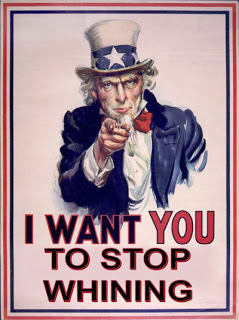 My life would be infinitely easier if I could find some kind of fulfillment in a job. Don't get me wrong, I like the job I have now and I feel like I'm doing well at it, but it's not where my passions lie -- heck, it's not even where my likes lie.
My life would be infinitely easier if I could find some kind of fulfillment in a job. Don't get me wrong, I like the job I have now and I feel like I'm doing well at it, but it's not where my passions lie -- heck, it's not even where my likes lie.I will admit that part of my reluctance comes from fear. Honest to god, nothing scares me more than the idea that one day I might really put some effort into my "career" and find that it ends up taking over my life. My biggest fear is becoming satisfied with my job. I'm no good at being satisfied. I rather like the fact that I'm not, although I'd certainly be willing to give that up for a book and movie deal.
I think people would like me to be, though. I think people expect me to be like the average person and have some kind of work related goals. My New Year's resolution for last year was to stay employed; I set the bar low.
It's not all that hard to get me to be enthusiastic about something, it's just that there's always going to be a ceiling on that, at least for most things.
If you're Nicole, our cats, or my writing, sky's the limit. Now I just need to find a job that involves any of those things.
Published on January 21, 2013 08:30
January 17, 2013
Non-fictional Fiction (Writing Stories About Girls Who Aren't Your Wife)
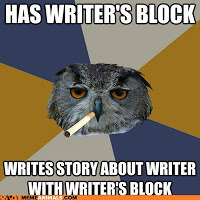 I have this ending, this ending that I wrote a good ten years ago. The ending is so much better than the short story that it's attached to I almost believe that it was written by someone else. And for years, I've been trying to figure out how to to rescue it.
I have this ending, this ending that I wrote a good ten years ago. The ending is so much better than the short story that it's attached to I almost believe that it was written by someone else. And for years, I've been trying to figure out how to to rescue it.It's actually a pretty universal ending. It's about a guy who realizes that the girl he's been sleeping with is actually more than that. The writing is delicate and strikes just the right note of sentimentality. I've actually gotten compliments on this ending, despite the festering wound that was the 20 odd pages that proceeded it.
Recently, I found myself writing a short story that was based upon the life I was living ten years ago. And, not surprisingly, it matched up perfectly to the ending. I just finished the first draft, or at least the first draft that I'm willing to pass along to my editor.
My editor, you see, is my wife, Nicole. And that's where it gets weird for me.
Because I didn't know Nicole ten years ago, and this new story is ostensibly a love story about a girl who isn't my wife. And it's written in the first person. And a lot of what happens is lifted directly from my life.
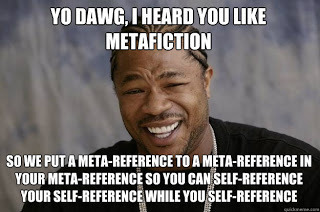 I don't think I've given Nicole such a story in a long, long time. I gave her "Unrequited" when we started dating and she liked it a lot. I gave it to her friends and they all assumed she was who I based the main character on, even though I wrote it years before I met her.
I don't think I've given Nicole such a story in a long, long time. I gave her "Unrequited" when we started dating and she liked it a lot. I gave it to her friends and they all assumed she was who I based the main character on, even though I wrote it years before I met her.I've written a few things here and there that featured women (seriously, I basically write love stories), but they were always stand ins for Nicole. I mean, they were pretty obvious stand ins for Nicole.
Over the last few years, it hasn't even been an issue. I wrote a non-fiction book that is just chock full of Nicole and I. I wrote a YA book that is clearly not about me in any way, shape, or form. So it's been some time since I gave Nicole a story to read that blurred that line between fiction and reality.
Here's the thing: if you're going to write a love story in the first person, you need to believe that the narrator is in love, or at least has the potential for that. And the narrator in this story is potentially in love with a woman who is not my wife. Then again, this is a story that takes place before I met her.
Nicole seems to have no problems with this, although that's only based upon what I told her, as I just printed out the story tonight. But I feel weird giving it to her.
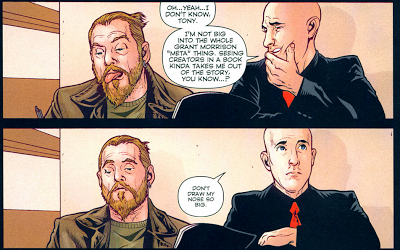 This is the problem with my obsession with metafiction: no one else cares. Nicole is going to read this as a story that takes place during a time before I met her, narrated by a guy who sounds an awful lot like me, but clearly isn't because, hey, look at that, I married her. And while I would be unable to separate my feelings while reviewing such a story, I'm pretty sure Nicole will do just fine.
This is the problem with my obsession with metafiction: no one else cares. Nicole is going to read this as a story that takes place during a time before I met her, narrated by a guy who sounds an awful lot like me, but clearly isn't because, hey, look at that, I married her. And while I would be unable to separate my feelings while reviewing such a story, I'm pretty sure Nicole will do just fine.It's still weird, though. For me, it's a big deal. My life and my fictional life are so intertwined that it sometimes gets tricky, or at least feels messy.
But I suppose this is why I'm a writer and not married to one.
Published on January 17, 2013 09:00
January 14, 2013
The Best X-Men Team
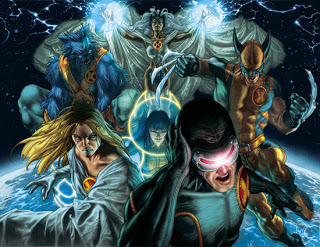 Comixology recently had a 99 cents sale of Astonishing X-Men comics, which allowed me to pick up the remaining issues by Warren Ellis that I'd yet to read. Those issues served to confirm something I had already suspected: these stories feature the perfect line-up.
Comixology recently had a 99 cents sale of Astonishing X-Men comics, which allowed me to pick up the remaining issues by Warren Ellis that I'd yet to read. Those issues served to confirm something I had already suspected: these stories feature the perfect line-up.That's a bold statement, I know. First, you have to consider the grand history of the X-Men and all X-Men related books. What would go into making a perfect team? How would such a thing even be defined? Personally, I feel like this team is about as perfect as can be, mostly because I had no idea I would feel that way. This isn't a team I sat down and thought about, not like I would have done when I was young.
Ultimately, it's about relationships, and the team of Cyclops, Emma Frost, Wolverine, Armor, Storm, and Beast has unbelievable chemistry.
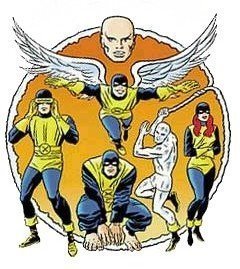 Here's the interesting thing about the X-men: even though there have literally been hundreds of members of the various mutant teams, there are probably only two dozen character who are considered iconic.
Here's the interesting thing about the X-men: even though there have literally been hundreds of members of the various mutant teams, there are probably only two dozen character who are considered iconic.It's actually pretty easy to break down. There's the original team of Cyclops, Marvel Girl, Angel, Beast, and Ice Man. There's the All New, All Different team, although most people only consider half of them iconic: Wolverine, Storm, Colossus, and Nightcrawler. There there are what I consider to be the Claremont creations: Shadowcat, Rogue, and Gambit. While the original New Mutants line-up is pretty well known (and perpetually reuniting, it seems), the original X-Force line-up and the extreme 90's creations that came there after may be better known (at the very least, Cable is).
Don't think I'm going into this as an outsider. The first two comic books I ever bought with my own money were Web of Spider-man #17 and Uncanny X-Men #207, which, to this day, has what must be considered the greatest cover featuring Wolverine that Marvel has ever published.
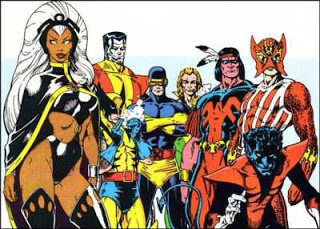 Poor Banshee, Thunderbird, and Sunfire...That was a great team. They were the punk rock X-Men, with Storm's mohawk and leather, Rogue and Shadowcat dressed like 80's club rats, and the new, edgy Phoenix. There was a lot to like about that team, but they existed before I found out about them, so it was the team that came after them that has always held a soft spot in my heart.
Poor Banshee, Thunderbird, and Sunfire...That was a great team. They were the punk rock X-Men, with Storm's mohawk and leather, Rogue and Shadowcat dressed like 80's club rats, and the new, edgy Phoenix. There was a lot to like about that team, but they existed before I found out about them, so it was the team that came after them that has always held a soft spot in my heart.After the Mutant Massacre, the X-Men were decimated, and over the course of the next year or so, Chris Claremont put together a new team, one I'll refer to as the Great Eight. It featured an iconic, old school core, in Storm, Wolverine, Colossus, and Rogue, plus 4 characters who had been around for a while, but gotten less exposure: Havok, Dazzler, Longshot, and Psylocke. While a bit unwieldy because of the number of members, the dynamics of this team were great, and I hold this team in high regard. It doesn't hurt that a) this was during the first few years of my comic book buying life and b) Claremont had artists like Silvestri and Lee to help him out.
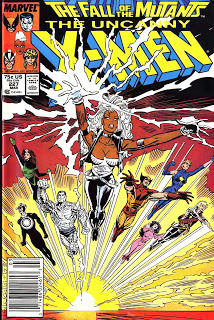 There's also probably something to be said for the fact that, back when the Great Eight were formed, there were only three other X-teams running around: Excaliber, New Mutants, and X-Factor. The pool of mutants had not been watered down by hundreds of new characters at this point. Heck, X-Factor and Excaliber were formed entirely of old characters who just switched teams.
There's also probably something to be said for the fact that, back when the Great Eight were formed, there were only three other X-teams running around: Excaliber, New Mutants, and X-Factor. The pool of mutants had not been watered down by hundreds of new characters at this point. Heck, X-Factor and Excaliber were formed entirely of old characters who just switched teams.When the X-Men became so big that they had to split into two separate teams, the writing was on the wall. More and more new characters showed up and things got all the more messy because of it. Stories became focused mainly on plot and character dynamics went by the way side.
It probably shouldn't have been surprising to me, then, that the same creator who brought me back into the X-Men books would be the one to take it back to basics. It's not unreasonable to think that when Grant Morrison took over New X-Men, he had a wide variety of characters to choose from, and probably no limitations on how many he could use. He was denied the use of the then-deceased Colossus (for which I am thankful), and settled on a team of five: Cyclops, Jean Grey, Wolverine, Beast, and Emma Frost. The interplay between these five characters was fantastic, and I think much of that had to do with the fact that there were only five of them.
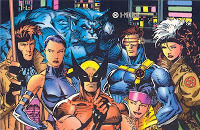 The Blue TeamIt's not surprising, really, that Morrison went this route with the team. After all, his own creation, the Invisibles, was made of up individual cells of teams, all of which had five members. Five seemed to be the team size of choice for Morrison, and it certainly offered more than enough tension to keep the stories entertaining and, perhaps more importantly, complex.
The Blue TeamIt's not surprising, really, that Morrison went this route with the team. After all, his own creation, the Invisibles, was made of up individual cells of teams, all of which had five members. Five seemed to be the team size of choice for Morrison, and it certainly offered more than enough tension to keep the stories entertaining and, perhaps more importantly, complex.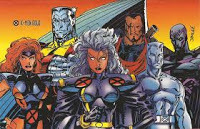 The Gold TeamWhen Morrison left the X-Men, he took one of his core five with him -- Jean Grey was, yet again, dead. Joss Whedon followed in Morrison's footsteps and filled the missing spot with exactly who everyone expected: Kitty Pryde. It's not hard to see how Shadowcat had influenced Whedon's work over the years, and adding her to the team as a sort of counter to Emma Frost was a nice touch. It was not, however, Whedon's best addition to the X-Men.
The Gold TeamWhen Morrison left the X-Men, he took one of his core five with him -- Jean Grey was, yet again, dead. Joss Whedon followed in Morrison's footsteps and filled the missing spot with exactly who everyone expected: Kitty Pryde. It's not hard to see how Shadowcat had influenced Whedon's work over the years, and adding her to the team as a sort of counter to Emma Frost was a nice touch. It was not, however, Whedon's best addition to the X-Men.Whedon expanded the team after only a few issues. The return of Colossus made for nice drama in how it affected the other characters, but Colossus himself had become something of a non-entity over the years, and even Whedon's stories did little to change that. So, no, resurrecting Colossus was not Whedon's signature move on his run, either.
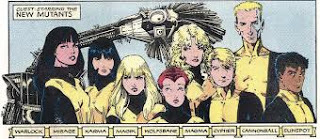 The best thing Whedon did while writing the X-Men was the introduction of Hisako Ichiki, who would later be known as Armor.
The best thing Whedon did while writing the X-Men was the introduction of Hisako Ichiki, who would later be known as Armor.Aside from having visually appealing mutant power, Armor became the third Robin to Wolverine's Batman. She's the innocent thrown into the crazy world of the X-men, but she's not over matched. Not only is she strong, but she's smart and witty. But she's still a teenager, and adding a young character to the mix created a brand new-old dynamic.
Just as Morrison had taken Jean Grey with him when he left, Whedon took Kitty Pryde. While Colossus hung on as best he could, the aforementioned non-entity aspect of his personality did not bode well for his future.
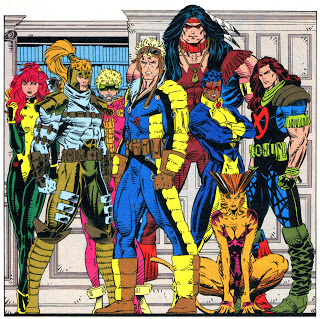 ExtremeWhile Morrison gifted us with the wonderful core of this team, as well as the brilliant Cyclops/Emma Frost relationship, and Whedon added perhaps the best (and currently wasted) new character in years with Armor, Warren Ellis adding the missing component, one that made perfect sense: Storm.
ExtremeWhile Morrison gifted us with the wonderful core of this team, as well as the brilliant Cyclops/Emma Frost relationship, and Whedon added perhaps the best (and currently wasted) new character in years with Armor, Warren Ellis adding the missing component, one that made perfect sense: Storm.The dynamics on this team are rather wonderful. You have the refined, cultured views of Emma, Storm, and Beast. You've got the Beast's brains. You've got Cyclops and Wolverine, long time rivals, who have both been soldiers since their mutant powers kicked in. There's Cyclops other sometime-rival, Storm, who is a diplomatic leader in contrast to Cylops' field leader. There's Emma, Beast, and even Wolverine wanting to teach Armor how to be an X-Men. There's Armor's awe in the events that follow the team around. And there is, of course, the fantastic Cyclops/Emma relationship.
This six member team is everything I could have ever wanted from an X-Men book. I know that it no longer exists (for a myriad of reasons), but here's hoping for some "untold tales" in the future.
Published on January 14, 2013 09:00
January 10, 2013
My 2012 Mix
Every year I put together a mix CD of the best of the music I listened to over the course the previous 12 months. My process is pretty specific.
1) These aren't the best overall songs I listened to in 2012, but more of a sampling. I try to avoid having more than one song by a band, although that can be hard if I suddenly discovered a band that has a dozen albums out already.
2) These are songs from albums that I listened to in 2012, but didn't necessarily come out in 2012. Heck, they might not even be all that new to me, they were just on heavy rotation.
3) Nothing slow ends up on these mixes. I have other mixes where those go (maybe some day I'll post those, too).
4) The total time of these songs is less than 80 minutes. Yes, I realize that mix CDs are antiquated. But my car only has a CD player and when I started making these things I didn't have a digital music player of any kind. I actually do have longer versions of these mixes, but there's something nice about forcing myself to strip the list down to the essentials.
5) The only order these songs are in are aesthetic. They're not ranked; they're put in an order that's meant to flow.
This year, I'm going to make this more interactive and turn to YouTube for, if not videos for each song, than audio in video form.
Nada Surf -- "Clear Eyes, Clouded Mind"
The Shins -- "Simple Song"
Someone Still Loves You Boris Yeltsin -- "Oregon Girl"
Passion Pit -- "Take a Walk"
Starfucker -- Isabella of Castile"
CSS -- "City Grrrl"
Metric -- "Synthetica"
Grouplove -- "Love Will Save Your Soul"
Kickdrums -- "Love Will Drive Your Mind Wild"
White Rabbits -- "Percussion Gun"
Head and the Heart -- "Down in the Valley"
The Lumineers -- "Ho Hey"
Of Monsters and Men -- "Little Talks"
Maritime -- "Annihilation Eyes"
Sunday's Best -- "Saccharine"
31knots -- "Chain Reaction"
The Pixies -- "Rock Music"
Minus the Bear -- "Steel and Blood"
The Sword -- "Dying Earth"
Thrice -- "Anthology"
And there you go -- my mix for 2012. Here's to some more great music in 2013!
1) These aren't the best overall songs I listened to in 2012, but more of a sampling. I try to avoid having more than one song by a band, although that can be hard if I suddenly discovered a band that has a dozen albums out already.
2) These are songs from albums that I listened to in 2012, but didn't necessarily come out in 2012. Heck, they might not even be all that new to me, they were just on heavy rotation.
3) Nothing slow ends up on these mixes. I have other mixes where those go (maybe some day I'll post those, too).
4) The total time of these songs is less than 80 minutes. Yes, I realize that mix CDs are antiquated. But my car only has a CD player and when I started making these things I didn't have a digital music player of any kind. I actually do have longer versions of these mixes, but there's something nice about forcing myself to strip the list down to the essentials.
5) The only order these songs are in are aesthetic. They're not ranked; they're put in an order that's meant to flow.
This year, I'm going to make this more interactive and turn to YouTube for, if not videos for each song, than audio in video form.
Nada Surf -- "Clear Eyes, Clouded Mind"
The Shins -- "Simple Song"
Someone Still Loves You Boris Yeltsin -- "Oregon Girl"
Passion Pit -- "Take a Walk"
Starfucker -- Isabella of Castile"
CSS -- "City Grrrl"
Metric -- "Synthetica"
Grouplove -- "Love Will Save Your Soul"
Kickdrums -- "Love Will Drive Your Mind Wild"
White Rabbits -- "Percussion Gun"
Head and the Heart -- "Down in the Valley"
The Lumineers -- "Ho Hey"
Of Monsters and Men -- "Little Talks"
Maritime -- "Annihilation Eyes"
Sunday's Best -- "Saccharine"
31knots -- "Chain Reaction"
The Pixies -- "Rock Music"
Minus the Bear -- "Steel and Blood"
The Sword -- "Dying Earth"
Thrice -- "Anthology"
And there you go -- my mix for 2012. Here's to some more great music in 2013!
Published on January 10, 2013 08:30
January 8, 2013
The Metafictional Genius of Gossip Girl
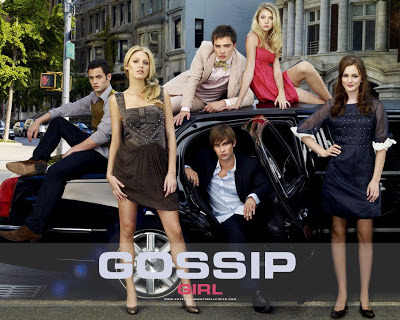 I've never been ashamed of my enjoyment of Gossip Girl, and I say this as a 37 year old married man who, in the eyes of most, should be ashamed. I generally ignore those people rather than try to explain to them exactly why I like the show, and why it's more than it may seem to be.
I've never been ashamed of my enjoyment of Gossip Girl, and I say this as a 37 year old married man who, in the eyes of most, should be ashamed. I generally ignore those people rather than try to explain to them exactly why I like the show, and why it's more than it may seem to be.I started watching Gossip Girl because it was produced by Josh Schwartz, the guy who created The OC, which I would guess most people would probably frown upon as well. He also co-created one of my favorite television shows ever, Chuck, which happened to premiere the same season as Gossip Girl.
The initial appeal of the show for me was pretty simple: outcast high school kid who finally gets to meet the girl of his dreams, the queen of the popular girls, who has returned to school from a year away a changed person. It is the classic story of the outsider getting the girl. Oh, and the outsider, Dan, happened to be an aspiring writer who lived with his dad and sister in a loft in Brooklyn. And just for good measure, the girl of his dreams was crazy hot.
Clearly, there was a certain level of wish fulfillment going on there (I should probably mention that Dan wouldn't have much trouble standing out in a crowd, either, at least in the real world). I mean, a few weeks into the show Dan has a short story published in the New Yorker, for crying out loud.
As with any show like this, I had to put up with a lot that wasn't for me. Nearly every scene involving Blair and Chuck was hard for me to watch. I understood, though, that this was a huge part of the show, and that there was a very vocal segment of the audience who wanted to see it.
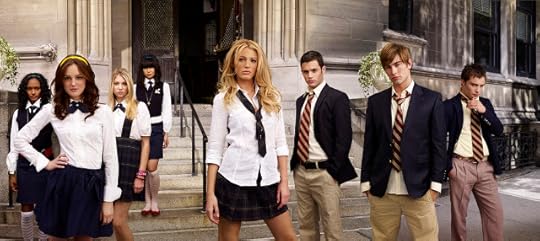 So if the wish fulfillment aspect of the show was balanced out by the over the top teen soap opera elements of the show, what was it that kept me watching? If those two elements negated each other, what made me go back to it week after week?
So if the wish fulfillment aspect of the show was balanced out by the over the top teen soap opera elements of the show, what was it that kept me watching? If those two elements negated each other, what made me go back to it week after week?That's simple: the writers were sneaky geniuses.
Josh Schwartz throws some self-awareness into most of his shows. But unlike The OC or Chuck, the entire premise of Gossip Girl was based upon metafiction. It's a show chronicling the lives of a handful of high school students who are dealing with the fact that the mysterious Gossip Girl is chronicling their lives. To a certain extent, the audience is Gossip Girl.
But wait, there's more.
When season 4 ended, 4/5's of what would be the main cast were on the verge of achieving their goals. Chuck was fully submerged in the business world. Blair was on her way to becoming a princess. Serena was headed to Hollywood to work in the movies. And the manuscript of Dan's first book was in the hands of a major publisher.
That just left Nate, the pretty boy who didn't seem to really do much on the show. And yet Nate was about to take the metafictional elements of the show to the next level.
In season 5, Nate takes over the NY Spectator, a newspaper that seemed to specialize in TMZ style reporting. Nate was now actively reporting on the world he lived in, ostensibly creating the stories that would end up in his own paper. To take it a step further, he eventually hires Serena to blog about her life for the newspaper. The characters were now making a living basically doing what Gossip Girl had been doing all those years, but now they had control of the information, or at least believed they did. They were maintaining the story they had for years claimed they wanted no part of, and they were doing it to keep themselves -- and, by extension, the show -- going.
Season 5 also featured the Gossip Girl moving from whoever the original mysterious blogger was to Georgina, who eventually passed it along to Serena, adding yet another layer to all this post-modernism. This just isn't the kind of thing you expect to find on a network television show.
And then we got the kicker.
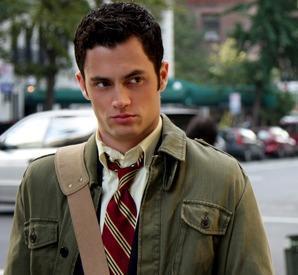 Yep, this dude.In the season finale, we find out that Dan was Gossip Girl all along. And just like that, my enjoyment of this show increased tenfold.
Yep, this dude.In the season finale, we find out that Dan was Gossip Girl all along. And just like that, my enjoyment of this show increased tenfold.Dan wrote himself into the story on Gossip Girl and in turn wrote himself into the story in real life. How many writers would kill to be able to write something and actually make that thing come true just by writing it? Now it had become a show chronicling the lives of a handful of people whose lives were being chronicled by one of their own. If Gossip Girl was the audience and Dan was the POV character in that first season, suddenly the two met and it came full circle.
There have been some complaints about the revelation that Dan was Gossip Girl. I know there are those who think there have been instances over the course of the show here it could not have been Dan sending out those e-mail blasts. These instances can easily be explained if you consider that Jenny knew what Dan was doing the whole time, and most likely posted some gossip herself. It also not unreasonable to think that Dan at some point had an automated system set up to forward e-mails out to his followers.
What people seem to be missing is that Gossip Girl/Dan never created or found the information that he sent out. It already existed. So if Dan got a tip about something, his choices were either to sit on it while it came out anyway, or release it himself and maintain the level of credibility Gossip Girl had among his followers. Everything he sent out was going to come out one way or the other.
I'm not sure that the writers intended for Dan to be Gossip Girl from the start, but upon re-watching the show, I've come across some wonderful character moments for Dan that were ostensibly hidden up to the finale. On numerous occasions, Dan finds himself in a position where he either has to keep a secret he doesn't want to keep or he wants to say something to someone that he doesn't say because he's worried about hurting them -- or looking bad.
 So instead of doing it "himself," Dan uses Gossip Girl to say and do the things he can't or won't. It's actually pretty unbelievable to see and, again, it's something of a dream for any writer to have that kind of power. Serena says in the finale that Dan was pulling everyone strings the whole time, and she's not exaggerating. There are moments in every season where Dan determines how the show goes based upon something he does as Gossip Girl.
So instead of doing it "himself," Dan uses Gossip Girl to say and do the things he can't or won't. It's actually pretty unbelievable to see and, again, it's something of a dream for any writer to have that kind of power. Serena says in the finale that Dan was pulling everyone strings the whole time, and she's not exaggerating. There are moments in every season where Dan determines how the show goes based upon something he does as Gossip Girl.What's interesting is that the clues were there, perhaps no so more than when Dan's first book, "Inside," is published. The book is a fictionalized version of his life (not unusual for most writers) in which he writes a book about them and it then ostracized for what he wrote. And, lo and behold, that's exactly what happens on the show. So at this point, he's created and ran Gossip Girl to become a part of high society, then turned that high society into a book in which his analog writes a book about the same high society -- and it sells tons of copies, almost exclusively to the same, aforementioned high society.
Has anyone not from Krypton had so much power in a story?
And let's not forget that Dan's initial literary success came with the publication of a short story he wrote about the first time he saw Serena, something that played a huge role in his creation of Gossip Girl.
I suppose the argument could be made that the writers weren't aware of what they were doing, but that would be a flimsy argument at best. I have no doubt that Dan as Gossip Girl didn't become a concrete story line until the show had already cover a few seasons. In fact, I think it's obvious that they decided upon Dan by the start of season 5 at the latest. It is, after all, the season when Gossip Girl chooses to stop posting. Turning over the reigns to Georgina (and then Serena) allowed them to take advantage of Gossip Girl's seeming omnipotence in ways that would have been impossible to reconcile with Dan.
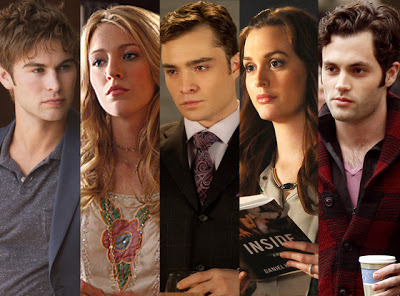 By the time the sixth and final season rolls around, Dan has reclaimed his role as Gossip Girl, but his real and fictional lives have become far too interconnected for their to be much separation. His scathing articles on each member of the show alienate him from everyone, but they're the very real combination of the Dan Humphry and Gossip Girl aesthetics, finally let loose on the world.
By the time the sixth and final season rolls around, Dan has reclaimed his role as Gossip Girl, but his real and fictional lives have become far too interconnected for their to be much separation. His scathing articles on each member of the show alienate him from everyone, but they're the very real combination of the Dan Humphry and Gossip Girl aesthetics, finally let loose on the world.Which, in the end, is the underlying theme of the show: the power of words -- and, specifically and ironically, the power of the written word.
Over the course of six seasons of the show, each cast member did horrible, horrible things to each other. Of the group of them, Dan's actions were, if not the least deplorable, then pretty close to the bottom of the list. Yet both the characters and, it seems, the audience turned on him when his tell all articles were released, turned on him in a way that no other character had been treated.
When the big reveal comes, the rest of the cast has no choice but to accept their roles and realize that, to a certain extent, they created Gossip Girl just as much as Dan did. They also made Gossip Girl necessary. I will fully admit that they could have spent more time explaining this, particularly given how quickly Serena seems to forgive Dan for pretty much everything he's ever done.
In the end, Dan had all the power, which is saying a lot, considering who he was up against. For those of us who write, seeing such power come from a few words was stunning.
Thanks, Gossip Girl, for making me think, for entertaining me, and for dangling an impossible carrot in front of my nose; it's made me work harder.
 *PS As much as I enjoyed the flirtation between Dan and Blair, in the end I don't think they worked like I thought they would, and much preferred Dan and Serena. Plus, you know, wish fulfillment and all...
*PS As much as I enjoyed the flirtation between Dan and Blair, in the end I don't think they worked like I thought they would, and much preferred Dan and Serena. Plus, you know, wish fulfillment and all...
Published on January 08, 2013 09:00
January 2, 2013
A Simple Batman Timeline (That Makes Sense)
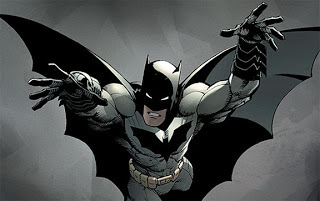 Ruining a Good Thing (For No Reason)
Ruining a Good Thing (For No Reason)DC seems to be determined to mess up one of the few great franchises they have, and it all stems from the rather asinine belief that the DCU can only be 5 years old. What possible difference could it make if the DCU has been around for five years as opposed to, say, 10, 15, or even 20, I have no idea. Apparently, someone at DC seems to think that five years of history will be less confusing to readers than 20 years of history, which suggests that at some point they're going to actually cover all five years of that history, which we all know isn't true. For that matter, comic book readers have been dealing with continuity for decades -- we're not stupid, but DC seems determined to treat us like we are.
Oh, and the whole "new reader friendly" bit is bunk. That might have been a reasonable goal back when the New 52 launched, but at this point the books are losing sales, not gaining new readers. DC has managed to stop bringing in new readers while alienating the readers they did have, which is a nifty talent.
Here's the other thing: allowing for a longer history does absolutely nothing to undermine the few positive, successful changes that have come from the New 52*. It does nothing to Wonder Woman's new origin, Superman's new costume, or...well, has anything else in the New 52 actually worked? If anything, it actually embraces the fact that both Animal Man and Swamp Thing regularly hint at a longer, shared history.
*I say this as a guy who thinks DC should revert back to old continuity, just keeping the few, aforementioned things that have worked. But I'm willing to compromise.
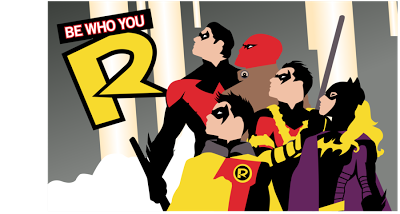 Courtesy of http://mattkrotzer.deviantart.com/Funny enough, we were initially led to believe that Batman (and Green Lantern) would see their histories more or less stay intact, but the edict from on high calling for a five year box for stories suddenly made such things as there having been 5 Robins over Batman's career make little sense. And so, in an effort to crush Batman's history into this tiny little box, they made changes.
Courtesy of http://mattkrotzer.deviantart.com/Funny enough, we were initially led to believe that Batman (and Green Lantern) would see their histories more or less stay intact, but the edict from on high calling for a five year box for stories suddenly made such things as there having been 5 Robins over Batman's career make little sense. And so, in an effort to crush Batman's history into this tiny little box, they made changes.The first and, really, most obvious, was Stephanie Brown. She was a main offender in two ways: five years was too short of a period for there to have been more than one Batgirl, and five years was way too short of a period for there to have been 5 Robins. Wiping Stephanie out of existence dropped the number of Batgirls to (technically) 3 (wiping out Cassandra Cain and the old version of Huntress wiped out 2 more) and dropped the number of Robins down to 4.
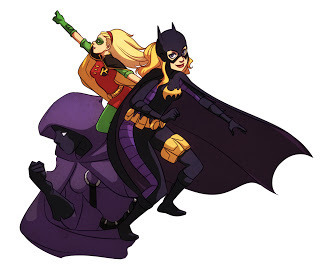 From http://gabzillaz.deviantart.com/Still, 4 Robins in 5 years was too many, particularly given that Dick Grayson had to grow up enough to want to quit and there had to be enough time for Jason to die (and come back). So it was time to drop Tim Drake as Robin. No, this time around, Tim has always been called Red Robin and he was Batman's partner, not his sidekick. Then, of course, they can just say that Damien just recently became Robin and presto! There have only been 2 Robins in 5 years.
From http://gabzillaz.deviantart.com/Still, 4 Robins in 5 years was too many, particularly given that Dick Grayson had to grow up enough to want to quit and there had to be enough time for Jason to die (and come back). So it was time to drop Tim Drake as Robin. No, this time around, Tim has always been called Red Robin and he was Batman's partner, not his sidekick. Then, of course, they can just say that Damien just recently became Robin and presto! There have only been 2 Robins in 5 years.The problem with all of that, of course, is that it still doesn't make any sense. For this new timeline to change any of the things they want it to change, Batman would have had a Robin while he was teamed up with his partner, Red Robin, or otherwise those years are a wash. And if there was no Robin during that time, then why change Tim to Red Robin? If Tim is younger than Dick (which seems to be established by Tim being in the Teen Titans), then for this new timeline to fit, he was Red Robin while Batman's sidekick was Jason Todd. And if that's the case, where the hell was Batman's partner when his sidekick was killed?
As stupid as all of that sounds, the worst part is that it's unnecessary, because no one was asking for answers to these questions. Comic book fans have a long history of ignoring continuity errors for the sake of good stories. I would think it would be impossible to read anything Bendis has ever written and not have cultivated that skill. And look -- his books sell a lot of copies. Comic book fans manage to get by without getting answers to questions they do have -- we certainly didn't need answers to questions we weren't even asking.
36, 24, 23, 19, 18, 18, 10
So one night I decided to figure out how a Batman timeline would make sense, at least as far as the ages of the Batman and Robin team. Because this is the kind of ridiculous shit I think about.
I had to start with Batman, of course, and in doing so, I had to think about how old he could have been in Year One. I also had to consider how old he seems now. He's old enough to be a father, but not too old to be running around doing the things that he does. I also considered the fact that he was probably stuck in boarding school after his parents died, so the earliest he'd be free of that would be 17.
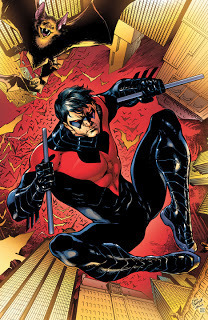 Let's say, then, for the sake of argument, that Batman begins his career at the age of 22. I think the guy we see in Year One is extremely mature of a 22 year old, but let's chalk that up to 5 years of studying and training abroad.
Let's say, then, for the sake of argument, that Batman begins his career at the age of 22. I think the guy we see in Year One is extremely mature of a 22 year old, but let's chalk that up to 5 years of studying and training abroad.Batman's initial solo adventures seem to hold a great deal of fascination for writers, so we don't want to limit that well. It would be easy to bring Robin on board after a single year, but let's make it two so we're not trying to cram too many stories in. This means that Batman is 24 when he takes Robin under his wing. Dick Grayson was the Boy Wonder, so in keeping with that, he shouldn't be a teenager, but he also shouldn't be too young, so 12 sounds about right. It also makes him half Batman's age, which has a nice symmetry to it.
Dick eventually out grows being Robin, and it would make sense that he would do so at 18, when he became an adult. That gives him and Bruce six years together as the Dynamic Duo, establishing the impressive legacy that all future Robins would have to live up to.
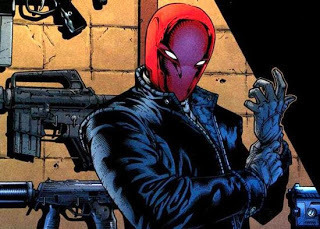 Jason Todd, the Robin gone badBatman goes another year flying solo until taking Jason in as the second Robin. Jason's back story sets him at being at least a bit older than Dick, so we'll go with 14. One of the keys to the mythology of Jason is that his time was tumultuous, but brief, so let's say he dies after only a single year as Robin, when he's 15, Bruce is 32, and Dick is 20.
Jason Todd, the Robin gone badBatman goes another year flying solo until taking Jason in as the second Robin. Jason's back story sets him at being at least a bit older than Dick, so we'll go with 14. One of the keys to the mythology of Jason is that his time was tumultuous, but brief, so let's say he dies after only a single year as Robin, when he's 15, Bruce is 32, and Dick is 20.It's clear from "A Lonely Place of Dying," that Tim intervenes not long after Jason dies because Batman has gone off the deep end. But it's a while after that before Bruce allows Tim to wear the green and red, so let's say another year. Tim should also have been in high school at this point and was considerably more mature than Dick or Jason, and if I made Jason 14, then I'll make Tim 15. Bruce would be 33, Dick 21, and Jason would have been 16, just a year older than Tim.
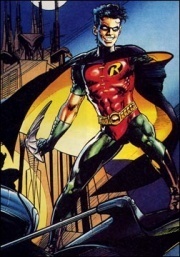 Tim Drake pre-horrible red legsJust like Dick before him, Tim out grows being Robin when he becomes an adult. This coincides with the addition of Damien to the cast. This means that Tim is Robin for 3 years, minus the few weeks that he quit and was replaced by Stephanie Brown, who was roughly the same age as him -- note that when Tim becomes Red Robin and Stephanie becomes Batgirl, she's starting college. So they're both 18 at this point.
Tim Drake pre-horrible red legsJust like Dick before him, Tim out grows being Robin when he becomes an adult. This coincides with the addition of Damien to the cast. This means that Tim is Robin for 3 years, minus the few weeks that he quit and was replaced by Stephanie Brown, who was roughly the same age as him -- note that when Tim becomes Red Robin and Stephanie becomes Batgirl, she's starting college. So they're both 18 at this point.Damien being Damien, he's 10. It's a part of his character that he's the youngest Robin. Which means, at this point, with Stephanie and Tim 18, the resurrected Jason is 19, Dick is 24, and Bruce is 36 -- which means Damien could have actually grown up normally as opposed to being accelerated in a lab.
It would be pretty easy to work Barbara Gordon aka Batgirl into this as well. She's probably a year younger than Dick, which means if she shows up when she's 13, Bruce and Dick have been together already for two years.
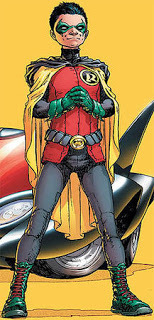 Current Robin, Damien WayneIn the end, that's just 14 years worth of history. Sure, it's nearly 3 times the amount DC is supposedly shooting for, but consider this: that's 73 years worth of stories squeezed down into 14 years.
Current Robin, Damien WayneIn the end, that's just 14 years worth of history. Sure, it's nearly 3 times the amount DC is supposedly shooting for, but consider this: that's 73 years worth of stories squeezed down into 14 years.No One Cares But Me
In the end, though, none of this will happen. Nothing even remotely like it will happen. Batman is the one franchise that keeps selling for DC no matter what. The can muck with it all they want and people will still buy the books.
The only way any of this comes close to fruition is if the DCU returns to its post-Crisis, pre-New 52 continuity. In that regard, though, I hold out hope. At some point DC is going to need to get readers' attention again and those universe altering crossovers usually do pretty well for them.
Published on January 02, 2013 08:30
December 28, 2012
My Top Music of 2012
I didn't listen to nearly as much new music this year as I normally do. Part of that was excessive periods of nostalgia where I would, for example, listen to nothing but the Pixies for weeks on end. I also seemed to lose track of when albums came out, so both the latest Pinback and the latest Baroness failed to show up on any of my lists because I've yet to listen to them.
I'm going to do things a bit differently than last year. Because I often buy albums that come out one year, but don't actually listen to them until the next (or fail to realize they even exist, as with the aforementioned Pinback and Baroness), I'm going to include them in my list. After all, this is the top music that I listened to this year -- there are no other parameters.
I will, however, mark the albums that came out this year in blue.
I'm also only doing a Top 5 album list, but I'm going to throw in a list of best songs to round it out.
The Top 5 Albums I Listened to in 2012
Honorable Mention: Starfucker -- "Starfucker"
I realize I'm late to the party on this band and this album. And, yes, it was "Rawnald Gregory Erickson the Second" which got my attention. But the rest of this album is so damn catchy and just layered with pop goodness. I don't even know if I'd consider the single to be in my top three from this record. It's certainly not number 1. That honor goes to the amazing "Isabella of Castile."
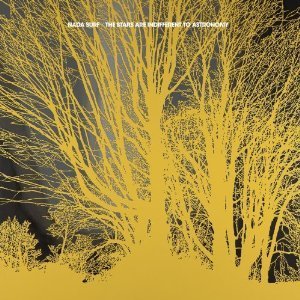
5. Nada Surf -- "The Stars Are Indifferent to Astronomy"
I'll be honest, this one almost didn't make it this high up on the list. It had no problem breaking the top 10, but does it belong in the top 5? I'm sure part of this is sentimental, given that Nada Surf is probably my favorite band. But it's also hard to look past songs like "Clear Eye Clouded Mind," "When I Was Young," and "The Future." The problem is that it's another 10 track album and there are a couple of fairly average Nada Surf tracks to be found. That said, an average Nada Surf track is still a few steps above songs by most bands. In the end, the rather wonderful acoustic versions found on the deluxe edition put this album over the top and into the top 5.
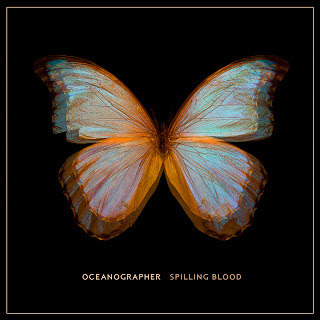
4. Oceanographer -- "Spilling Blood"
It's been a while since a new Oceanographer album came out, but, boy, was it worth the wait. I'm constantly amazed that this band doesn't have a bigger following. The opener, "Hardest Thing to Say" is both beautiful and incredibly catchy, with some of the best lyrics I've heard in a while. Oceanographer have always produced lovely, atmospheric music, but there's a sense of urgency on this album, there's more drive. They've also never been afraid of expand the variety of instruments they use, but they push the envelope even more this time around.
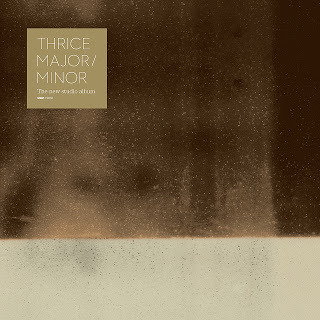
3. Thrice -- "Major/Minor"
This is one of those albums that was released last year, but I just got around to listening to this year. From what I've read online, this was Thrice's last album. It's also quite possibly their best.
Thrice started off as a pretty straight forward punk/hardcore band, morphed into the "screamo" genre, and then began dabbling in other sounds -- they even recorded a concept album (two, technically). And while the sound on "Major/Minor" is in keeping with the album before this ("Beggars"), the overall quality is higher. These songs rock, but they rock not because of blown speaker, drop D power chords, but because the riffs have power, the song structures are dynamic, and the vocals are urgent. The entire record is great, but if you want a song that's emblematic, try "Anthology."
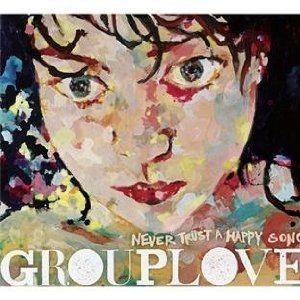 2. Grouplove -- "Never Trust a Happy Song"
2. Grouplove -- "Never Trust a Happy Song"
I'm just as surprised that this album is on this list -- not to mention at #2! -- as you are. I would imagine your surprise stems from the fact that you are only really familiar with Grouplove because of their big hit, "Tongue Tied." I was actually pretty confused by that song, because the first song by them I ever heard was "Cruel and Beautiful World," the second to last song ever played on Chuck, and it sounds nothing at all like "Tongue Tied." In fact, both of those songs stand out on the album as being relative departures.
What the songs on this album do have in common, though, are crazy catchy tunes, fantastic harmonies, and an abundance of energy. The band has three singers, and while one handles the lead on the majority of the tracks, the other two hold their own on their respective songs. It's something of an embarrassment of riches, as they could easily be lead singers in their own bands. If I were you, I'd check out "Lovely Cup" and "Close Your Eyes and Count to Ten" for a good indication of what Grouplove can do.
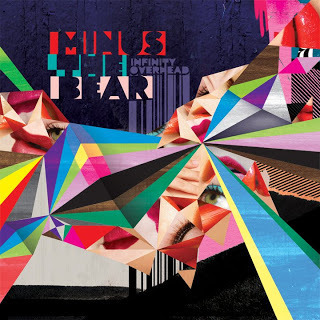
1. Minus the Bear -- Infinity Overhead
I could not be happier to name "Infinity Overhead" as the best album of 2012. I didn't discover Minus the Bear until 2006, at which point they had a combined 5 EPs and albums out. I couldn't get enough. I loved everything they released, until they released something new. "Planet of Ice" just didn't do it for me, and even the superior version of "Burying Luck" on "Acoustics" did little to quell my fears that Minus the Bear was losing their touch. "Omni" wasn't much better, and perhaps even worse, as I was frustrated that a B-side on the "Into the Mirror" single was better than all the songs on the full album. To say the least, I was unsure going into "Infinity Overhead."
I could not have been happier with what I found.
The songs are more focused this time around. The duel guitars and keyboards have finally found the balance that has so often been missing. "Steel and Blood" opens the album and it is darn near the perfect modern Minus the Bear song. It's the perfect mix of choppy guitar riff, operatic keyboard parts, catchy vocals, and a driving rhythm section. The angular sound from their earlier albums has been replaced with something approaching 70's anthem rock, but in a good way. Now that I think about it, I'd kind of love to hear Minus the Bear cover a Styx song.
"Lonely Gun" lays down a crazy groove that is begging for a club remix, but manages to avoid being cheesy. Have fun trying to figure out the pattern and rhythm to the ending of "Empty Party Rooms" as it will haunt you until you're able to go over it in your head without hearing it. "Cold Company" finishes the album with dramatic flare, going so far as to reference Sisyphus, and nothing says drama like Greek mythology.
For all the albums I listened to this year, this was the most welcome. Minus the Bear have returned to pedestal upon which I'd held them for so long. I feel like they're just now hitting their stride, and I can't wait to hear what comes next.
The Best Song I Listened to in 2012
(in no particular order)
"Anthology" -- Thrice
"When I Was Young" -- Nada Surf
"Isabella of Castile" -- Starfucker
"Percussion Gun" -- White Rabbits
"The Void" -- Metric
"Ho Hey" -- Lumineers
"Blood and Steel" -- Minus the Bear
"Saccharine" -- Sunday's Best
"Chain Reaction" -- 31knots
"Hardest Thing to Say" -- Oceanographer
As much as I love all the songs on that list, Song of the Year has to go to the unbelievably delightful single from the Lumineers.
I'll say this much for the year in music: I've got an awful lot of stuff to catch up on.
I'm going to do things a bit differently than last year. Because I often buy albums that come out one year, but don't actually listen to them until the next (or fail to realize they even exist, as with the aforementioned Pinback and Baroness), I'm going to include them in my list. After all, this is the top music that I listened to this year -- there are no other parameters.
I will, however, mark the albums that came out this year in blue.
I'm also only doing a Top 5 album list, but I'm going to throw in a list of best songs to round it out.
The Top 5 Albums I Listened to in 2012
Honorable Mention: Starfucker -- "Starfucker"
I realize I'm late to the party on this band and this album. And, yes, it was "Rawnald Gregory Erickson the Second" which got my attention. But the rest of this album is so damn catchy and just layered with pop goodness. I don't even know if I'd consider the single to be in my top three from this record. It's certainly not number 1. That honor goes to the amazing "Isabella of Castile."

5. Nada Surf -- "The Stars Are Indifferent to Astronomy"
I'll be honest, this one almost didn't make it this high up on the list. It had no problem breaking the top 10, but does it belong in the top 5? I'm sure part of this is sentimental, given that Nada Surf is probably my favorite band. But it's also hard to look past songs like "Clear Eye Clouded Mind," "When I Was Young," and "The Future." The problem is that it's another 10 track album and there are a couple of fairly average Nada Surf tracks to be found. That said, an average Nada Surf track is still a few steps above songs by most bands. In the end, the rather wonderful acoustic versions found on the deluxe edition put this album over the top and into the top 5.

4. Oceanographer -- "Spilling Blood"
It's been a while since a new Oceanographer album came out, but, boy, was it worth the wait. I'm constantly amazed that this band doesn't have a bigger following. The opener, "Hardest Thing to Say" is both beautiful and incredibly catchy, with some of the best lyrics I've heard in a while. Oceanographer have always produced lovely, atmospheric music, but there's a sense of urgency on this album, there's more drive. They've also never been afraid of expand the variety of instruments they use, but they push the envelope even more this time around.

3. Thrice -- "Major/Minor"
This is one of those albums that was released last year, but I just got around to listening to this year. From what I've read online, this was Thrice's last album. It's also quite possibly their best.
Thrice started off as a pretty straight forward punk/hardcore band, morphed into the "screamo" genre, and then began dabbling in other sounds -- they even recorded a concept album (two, technically). And while the sound on "Major/Minor" is in keeping with the album before this ("Beggars"), the overall quality is higher. These songs rock, but they rock not because of blown speaker, drop D power chords, but because the riffs have power, the song structures are dynamic, and the vocals are urgent. The entire record is great, but if you want a song that's emblematic, try "Anthology."
 2. Grouplove -- "Never Trust a Happy Song"
2. Grouplove -- "Never Trust a Happy Song"I'm just as surprised that this album is on this list -- not to mention at #2! -- as you are. I would imagine your surprise stems from the fact that you are only really familiar with Grouplove because of their big hit, "Tongue Tied." I was actually pretty confused by that song, because the first song by them I ever heard was "Cruel and Beautiful World," the second to last song ever played on Chuck, and it sounds nothing at all like "Tongue Tied." In fact, both of those songs stand out on the album as being relative departures.
What the songs on this album do have in common, though, are crazy catchy tunes, fantastic harmonies, and an abundance of energy. The band has three singers, and while one handles the lead on the majority of the tracks, the other two hold their own on their respective songs. It's something of an embarrassment of riches, as they could easily be lead singers in their own bands. If I were you, I'd check out "Lovely Cup" and "Close Your Eyes and Count to Ten" for a good indication of what Grouplove can do.

1. Minus the Bear -- Infinity Overhead
I could not be happier to name "Infinity Overhead" as the best album of 2012. I didn't discover Minus the Bear until 2006, at which point they had a combined 5 EPs and albums out. I couldn't get enough. I loved everything they released, until they released something new. "Planet of Ice" just didn't do it for me, and even the superior version of "Burying Luck" on "Acoustics" did little to quell my fears that Minus the Bear was losing their touch. "Omni" wasn't much better, and perhaps even worse, as I was frustrated that a B-side on the "Into the Mirror" single was better than all the songs on the full album. To say the least, I was unsure going into "Infinity Overhead."
I could not have been happier with what I found.
The songs are more focused this time around. The duel guitars and keyboards have finally found the balance that has so often been missing. "Steel and Blood" opens the album and it is darn near the perfect modern Minus the Bear song. It's the perfect mix of choppy guitar riff, operatic keyboard parts, catchy vocals, and a driving rhythm section. The angular sound from their earlier albums has been replaced with something approaching 70's anthem rock, but in a good way. Now that I think about it, I'd kind of love to hear Minus the Bear cover a Styx song.
"Lonely Gun" lays down a crazy groove that is begging for a club remix, but manages to avoid being cheesy. Have fun trying to figure out the pattern and rhythm to the ending of "Empty Party Rooms" as it will haunt you until you're able to go over it in your head without hearing it. "Cold Company" finishes the album with dramatic flare, going so far as to reference Sisyphus, and nothing says drama like Greek mythology.
For all the albums I listened to this year, this was the most welcome. Minus the Bear have returned to pedestal upon which I'd held them for so long. I feel like they're just now hitting their stride, and I can't wait to hear what comes next.
The Best Song I Listened to in 2012
(in no particular order)
"Anthology" -- Thrice
"When I Was Young" -- Nada Surf
"Isabella of Castile" -- Starfucker
"Percussion Gun" -- White Rabbits
"The Void" -- Metric
"Ho Hey" -- Lumineers
"Blood and Steel" -- Minus the Bear
"Saccharine" -- Sunday's Best
"Chain Reaction" -- 31knots
"Hardest Thing to Say" -- Oceanographer
As much as I love all the songs on that list, Song of the Year has to go to the unbelievably delightful single from the Lumineers.
I'll say this much for the year in music: I've got an awful lot of stuff to catch up on.
Published on December 28, 2012 07:00
October 24, 2012
Dude, what the hell?
This reminds me of a pet peeve of mine. At some point over the last few years, the phrase "what the hell?" has been shortened to "the hell?" and I have no idea why. It's one word. Personally, I think "the hell" without "what" sounds ridiculous. It loses context. I could just as easily start saying things like "the dog?" or "the blue?"
It's weird how quickly that's become universal and I'm still trying to figure out how it happened. Clearly, there's a conspiracy regarding the word "what." Until I figure it out, I will continue to be the guy harassing people who shorten it by yelling "what! what! what!" over and over again.
So, yeah, dude, what the hell?
It's been three weeks since I posted anything on this blog and it's not for a lack of ideas. I have close to a dozen drafts of blog posts just waiting for me to finish them. But I appear to have lost motivation.
Part of it is the fact that I've got less time these days. We just bought a house, so now I feel like I can take some ownership of the work that needs to be done -- and there's a lot. I've also got a new position at work, one that actually requires me to work for most of the day, as opposed to sitting around blogging and posting on Facebook (although I still do that).
Part of it is that my writing energies have gone elsewhere these days or, more accurately, that my writing energies are recharging. I spent a lot of time finishing the latest round of edits for Master of the House to the point where it encompassed most of my world. I'm done with it now and have walked away, but I also found that needed to get away from writing for a purpose, if that makes any sense. I'm also at a bit of a crossroads where I don't really know what to write next because I have so many options.
And part of it is that I don't know how much value this blog has. I suppose there's a confessional aspect to it, but I only publish posts I feel are fit for general consumption, so it's not really that confessional. I guess I use this space to sometimes write about things I feel deserve some discussion, but how much of that can anyone really do if there's no particular point?
Initially, I think this blog was an attempt at brand building. After all, a vibrant online presence is necessary these days if you want to sell anything, and I'm definitely selling something -- not just my book, but myself. But I Pray Hardest When I'm Being Shot At came out 16 months ago, so I don't have a whole lot of news on that front, at least not until the inevitable movie deal.
Selling myself has more or less just been being myself and hoping that people who read this think I'm a pretty decent guy and, hey, not a bad writer, either.
You get a lot of "what's the point?" when writing a blog. You wonder if anyone's even reading it or why would anyone read it. You wonder if what you're writing will have any kind of impact on anyone. But I suppose you kind of wonder that about any of your writing.
So there you go: that's where I've been. But I'm hoping to make a return.
It's weird how quickly that's become universal and I'm still trying to figure out how it happened. Clearly, there's a conspiracy regarding the word "what." Until I figure it out, I will continue to be the guy harassing people who shorten it by yelling "what! what! what!" over and over again.
So, yeah, dude, what the hell?
It's been three weeks since I posted anything on this blog and it's not for a lack of ideas. I have close to a dozen drafts of blog posts just waiting for me to finish them. But I appear to have lost motivation.
Part of it is the fact that I've got less time these days. We just bought a house, so now I feel like I can take some ownership of the work that needs to be done -- and there's a lot. I've also got a new position at work, one that actually requires me to work for most of the day, as opposed to sitting around blogging and posting on Facebook (although I still do that).
Part of it is that my writing energies have gone elsewhere these days or, more accurately, that my writing energies are recharging. I spent a lot of time finishing the latest round of edits for Master of the House to the point where it encompassed most of my world. I'm done with it now and have walked away, but I also found that needed to get away from writing for a purpose, if that makes any sense. I'm also at a bit of a crossroads where I don't really know what to write next because I have so many options.
And part of it is that I don't know how much value this blog has. I suppose there's a confessional aspect to it, but I only publish posts I feel are fit for general consumption, so it's not really that confessional. I guess I use this space to sometimes write about things I feel deserve some discussion, but how much of that can anyone really do if there's no particular point?
Initially, I think this blog was an attempt at brand building. After all, a vibrant online presence is necessary these days if you want to sell anything, and I'm definitely selling something -- not just my book, but myself. But I Pray Hardest When I'm Being Shot At came out 16 months ago, so I don't have a whole lot of news on that front, at least not until the inevitable movie deal.
Selling myself has more or less just been being myself and hoping that people who read this think I'm a pretty decent guy and, hey, not a bad writer, either.
You get a lot of "what's the point?" when writing a blog. You wonder if anyone's even reading it or why would anyone read it. You wonder if what you're writing will have any kind of impact on anyone. But I suppose you kind of wonder that about any of your writing.
So there you go: that's where I've been. But I'm hoping to make a return.
Published on October 24, 2012 08:30
October 3, 2012
Happy Birthday to me.
I wish I'd been happier.
Tomorrow (as I'm writing this on the 2nd) is my birthday. I will be 37. I've taken the day off work and will most likely spend the day sitting around, watching baseball, and being introspective which, to be perfectly honest, is not far from how I spend a lot of my days. I'll do a little writing, probably go buy a doughnut, probably drink some whiskey, maybe play some video games, definitely read some comic books. Eventually, Nicole will get home from work and we'll probably do something nice for dinner and she'll give me presents and all in all it will be just about everything I could want from a birthday.
 Just a little while ago, I watched the trailer for a movie called Liberal Arts, which, as you might imagine, appealed to me (the title, not the trailer, although it was nice). Towards the end of said trailer, the 35 year old lead character talks about how exciting college was because it made you think that, after you graduated, anything was possible. And not that basing your life on things from movies is a good idea, but it struck me that I didn't particularly feel that way about college, because most of what I felt was negative.
Just a little while ago, I watched the trailer for a movie called Liberal Arts, which, as you might imagine, appealed to me (the title, not the trailer, although it was nice). Towards the end of said trailer, the 35 year old lead character talks about how exciting college was because it made you think that, after you graduated, anything was possible. And not that basing your life on things from movies is a good idea, but it struck me that I didn't particularly feel that way about college, because most of what I felt was negative.
For basically the first 28 years of my life I was angry and sad. There were bursts of happiness here and there, of course, but my overall demeanor was that of a guy who was unhappy with himself and the world around him. Anger and sadness beget anger and sadness, and I found that I continually made decisions to maintain both of those emotions. I wasn't always conscious of it, and I had help from the outside world, but I wallowed in negative emotions as if it would keep me alive, when it almost always made my life worse.
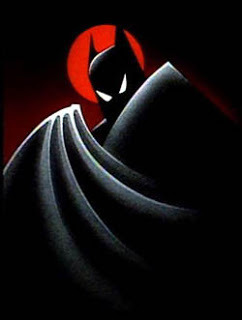 If there is one thing I would change about my life it's that I wish I would have -- could have -- been happier. I'm almost always struck by the vast number of moments in my life that have been diminished because I lacked the capacity to enjoy them.
If there is one thing I would change about my life it's that I wish I would have -- could have -- been happier. I'm almost always struck by the vast number of moments in my life that have been diminished because I lacked the capacity to enjoy them.
So how did I change? If I'm 37 now, and only led this depressing life for 28 years, then something must have happened, right? If you knew me well enough you'd probably say something like "Aha! You have never been happier than you are with Nicole, so she's what did it!" And I would tell you that, yes, Nicole has expanded my range of joy to an extent I never thought possible. And I would also tell you that she came after the change.
I spent a lot of my life being a serial monogamist which had caused me a lot of problems, but when 2004 started, I was single. In fact, I was single after coming out of a relationship that I ended because I knew it wasn't a good fit. I didn't stick it out even though it was bad, I didn't wait for something truly horrible to happen to push me to end it, I saw the writing on the wall and broke up with her. It was more or less the first time I'd ever done that.
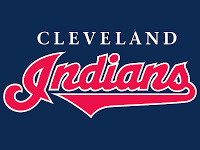 Sad to say, but choosing to leave a relationship can be something of a boost to the ego. It was me saying, hey, I don't need to stick with this if it's not working -- I'm pretty sure I'll find someone else down the line.
Sad to say, but choosing to leave a relationship can be something of a boost to the ego. It was me saying, hey, I don't need to stick with this if it's not working -- I'm pretty sure I'll find someone else down the line.
My new found confidence meant everything. I started going out more. I convinced a group of people to get together every other Thursday night. I dated and that's all it was -- dating. My job was easy, I made good money, I'd finished the first draft of "Reliquary," and I was even going to the gym on a regular basis. Each weekday morning, I would put on my headphones and walk to work.
Los Angeles was full of promise, and 2004 was the best year of my life.
Honestly, after 11 months, 2004 still would have claimed the top spot, which is equal parts an indication of how great that year was for me and how unremarkable the years previous had been.
But 2004 wanted to seal the deal. It wanted to insure that it would forever be the year that I judge all other years by. And so, on December 1st, I met Nicole.
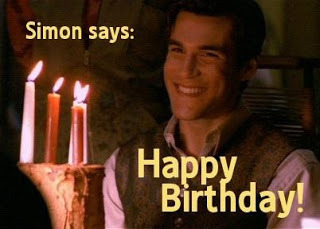 It's worth pointing out that the 11 months that lead up to that day were essential in making that day happen. After 28 years, I'd suddenly become who I should have been all along. No way do I meet Nicole if those previous 11 months hadn't happened. No way do we stay together; no way we make it this far.
It's worth pointing out that the 11 months that lead up to that day were essential in making that day happen. After 28 years, I'd suddenly become who I should have been all along. No way do I meet Nicole if those previous 11 months hadn't happened. No way do we stay together; no way we make it this far.
So here I stand, 8 years removed from the greatest year of my life and I have to say, I feel like I'm due for another -- I think 2004 has a challenger somewhere down the line.
The fact that such a thing is even a possibility says an awful lot.
Tomorrow (as I'm writing this on the 2nd) is my birthday. I will be 37. I've taken the day off work and will most likely spend the day sitting around, watching baseball, and being introspective which, to be perfectly honest, is not far from how I spend a lot of my days. I'll do a little writing, probably go buy a doughnut, probably drink some whiskey, maybe play some video games, definitely read some comic books. Eventually, Nicole will get home from work and we'll probably do something nice for dinner and she'll give me presents and all in all it will be just about everything I could want from a birthday.
 Just a little while ago, I watched the trailer for a movie called Liberal Arts, which, as you might imagine, appealed to me (the title, not the trailer, although it was nice). Towards the end of said trailer, the 35 year old lead character talks about how exciting college was because it made you think that, after you graduated, anything was possible. And not that basing your life on things from movies is a good idea, but it struck me that I didn't particularly feel that way about college, because most of what I felt was negative.
Just a little while ago, I watched the trailer for a movie called Liberal Arts, which, as you might imagine, appealed to me (the title, not the trailer, although it was nice). Towards the end of said trailer, the 35 year old lead character talks about how exciting college was because it made you think that, after you graduated, anything was possible. And not that basing your life on things from movies is a good idea, but it struck me that I didn't particularly feel that way about college, because most of what I felt was negative.For basically the first 28 years of my life I was angry and sad. There were bursts of happiness here and there, of course, but my overall demeanor was that of a guy who was unhappy with himself and the world around him. Anger and sadness beget anger and sadness, and I found that I continually made decisions to maintain both of those emotions. I wasn't always conscious of it, and I had help from the outside world, but I wallowed in negative emotions as if it would keep me alive, when it almost always made my life worse.
 If there is one thing I would change about my life it's that I wish I would have -- could have -- been happier. I'm almost always struck by the vast number of moments in my life that have been diminished because I lacked the capacity to enjoy them.
If there is one thing I would change about my life it's that I wish I would have -- could have -- been happier. I'm almost always struck by the vast number of moments in my life that have been diminished because I lacked the capacity to enjoy them.So how did I change? If I'm 37 now, and only led this depressing life for 28 years, then something must have happened, right? If you knew me well enough you'd probably say something like "Aha! You have never been happier than you are with Nicole, so she's what did it!" And I would tell you that, yes, Nicole has expanded my range of joy to an extent I never thought possible. And I would also tell you that she came after the change.
I spent a lot of my life being a serial monogamist which had caused me a lot of problems, but when 2004 started, I was single. In fact, I was single after coming out of a relationship that I ended because I knew it wasn't a good fit. I didn't stick it out even though it was bad, I didn't wait for something truly horrible to happen to push me to end it, I saw the writing on the wall and broke up with her. It was more or less the first time I'd ever done that.
 Sad to say, but choosing to leave a relationship can be something of a boost to the ego. It was me saying, hey, I don't need to stick with this if it's not working -- I'm pretty sure I'll find someone else down the line.
Sad to say, but choosing to leave a relationship can be something of a boost to the ego. It was me saying, hey, I don't need to stick with this if it's not working -- I'm pretty sure I'll find someone else down the line.My new found confidence meant everything. I started going out more. I convinced a group of people to get together every other Thursday night. I dated and that's all it was -- dating. My job was easy, I made good money, I'd finished the first draft of "Reliquary," and I was even going to the gym on a regular basis. Each weekday morning, I would put on my headphones and walk to work.
Los Angeles was full of promise, and 2004 was the best year of my life.
Honestly, after 11 months, 2004 still would have claimed the top spot, which is equal parts an indication of how great that year was for me and how unremarkable the years previous had been.
But 2004 wanted to seal the deal. It wanted to insure that it would forever be the year that I judge all other years by. And so, on December 1st, I met Nicole.
 It's worth pointing out that the 11 months that lead up to that day were essential in making that day happen. After 28 years, I'd suddenly become who I should have been all along. No way do I meet Nicole if those previous 11 months hadn't happened. No way do we stay together; no way we make it this far.
It's worth pointing out that the 11 months that lead up to that day were essential in making that day happen. After 28 years, I'd suddenly become who I should have been all along. No way do I meet Nicole if those previous 11 months hadn't happened. No way do we stay together; no way we make it this far.So here I stand, 8 years removed from the greatest year of my life and I have to say, I feel like I'm due for another -- I think 2004 has a challenger somewhere down the line.
The fact that such a thing is even a possibility says an awful lot.
Published on October 03, 2012 08:30
September 21, 2012
Obligatory "New 52 One Year Later" Post
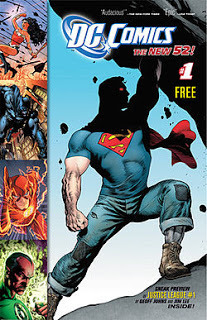 Warning: detailed discussion of comic books ahead!
Warning: detailed discussion of comic books ahead!A year ago, DC relaunched their entire line of comics with 52 brand new first issues. They also reboot their shared universe, although they made a point of saying that the two franchises that made them money -- Green Lantern and Batman -- would remain mostly the same.
I would have to imagine that deciding what to do with the GL and Batman lines was a tough call, but I'll get to more on that in a minute.
So here we are, a year later, and everyone is giving their views on why the relaunch was either good or bad. God forbid I stay silent!
I was a huge fan of the idea of the relaunch, although that was mostly because it was something to be excited about with regards to corporately owned comics. The Big Two hadn't gotten me excited about their products in years. It was also nice to be given and opportunity to try some titles that I might not have ever thought to try in the past. Smart retailers were offering deals for people who ordered all 52 new #1's. That's what I did.
The initial launch was equal parts good and equal parts bad. The failure to hire creators who weren't straight white men was a colossal mistake for a company whose expressed goal for the relaunch was to modernize and diversify. While it was great that Jim Lee's Justice League was the flagship title, having a special midnight sale and only offering the one book was a big misstep, particularly given the efforts to bring in non-comic book readers. All they were going to find was a single, superhero comic for them to try, instead of a wide range of genres that might actually be appealing to them.
The upside was that there WAS a wide range of genres as part of the New 52, including some cross genre pollination of traditional superhero characters. DC really seemed to try to return to it's pre-Crisis roots with its line up; they weren't just superhero books anymore.
The problem with that is that they seemed obsessed with the number 52, and I challenge you to find me 52 different creative teams that are, if not great, than at least good. Oh, and they have to be able to produce a new issue every month. That's not going to happen. So the quality on the New 52 books fell off a cliff past a certain title, and the books in free fall were usually the non-superhero ones.
Here's the thing: As I've been reading these comics for the past year and watching as they've slowly but surely changed things in the Batman line that were supposed to remain untouched -- changed them for no apparent reason other than that they feel they can, I've realized that the reboot has been a fairly spectacular failure. The relaunch, on the other hand, has been pretty good.
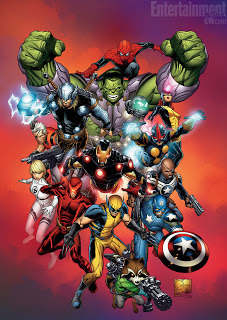 I would go so far to say that I think Marvel is getting this part of it right -- they're relaunching, but not rebooting. I think Marvel's big mistake is dragging it out over months. I don't think that will get non-fans into the stores the same way.
I would go so far to say that I think Marvel is getting this part of it right -- they're relaunching, but not rebooting. I think Marvel's big mistake is dragging it out over months. I don't think that will get non-fans into the stores the same way.There is one clear way of determining whether or not DC's reboot (not relaunch) worked: Would still having all that old continuity (such as it was) have made the current batch of titles impossible?
The answer is no.
Let's look at what's been most successful in the New 52 so far, and I mean that in both a sales sense and based upon critical reception.
You've got the "dark" line of books, anchored by Swamp Thing and Animal Man. Both could have existed in the old DCU and, in fact, both seem to suggest that their former histories are still somewhat intact. After all, both are returning to their former roles when these series start.
Aquaman is cool. Again, a big part of Aquaman's initial arc was based upon the fact that he doesn't get any respect, something that was very true of the old DCU. Nothing that's been laid out so far couldn't have been worked into old continuity -- lord knows his origins has been reworked often enough.
Speaking of which, look at Superman. A new costume is easy to explain. A new history is just as easy. The dissolution of his marriage to Lois would be tricky, but there's already a pretty reasonable proposal for that story floating around, co-written by the guy who's currently writing Action.
There really isn't a single thing about the New 52 DCU that couldn't exist in the old one. In other words, we've gained far, far less than we've lost.
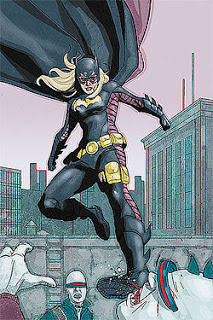 This happened.Even if I look past the asinine changes they keep making to Batman's history for no discernible reason (and that's another blog post all together), and even ignore the complete disappearance of the first great legacy character, Wally West, think about the other things we've lost. The whole Gotham Central saga that eventually led to Renee becoming the Question -- gone. The wonderful family that was the original Teen Titans who grew up and stayed Titans -- never happened. All that glorious history, filled with all those ridiculous characters -- wiped away.
This happened.Even if I look past the asinine changes they keep making to Batman's history for no discernible reason (and that's another blog post all together), and even ignore the complete disappearance of the first great legacy character, Wally West, think about the other things we've lost. The whole Gotham Central saga that eventually led to Renee becoming the Question -- gone. The wonderful family that was the original Teen Titans who grew up and stayed Titans -- never happened. All that glorious history, filled with all those ridiculous characters -- wiped away.Look at it like this: A few weeks ago I read the pretty wonderful The Marvels Project by Ed Brubaker and Steve Epting. About halfway through I realized that we will never get that kind of story set in the DCU. That's just sad.
If I look at whether or not the New 52 has been a success simply through my own experiences, then it's been a horrible failure. I bought every single one of those first issues. I don't buy any of them monthly anymore and I've just cut the string on buying any of them as trades (basically because of the Batman debacle).
No, strike that, the New 52 has been pretty good for me -- a lot of those first issues snagged me a nice profit on eBay.
Published on September 21, 2012 16:01



